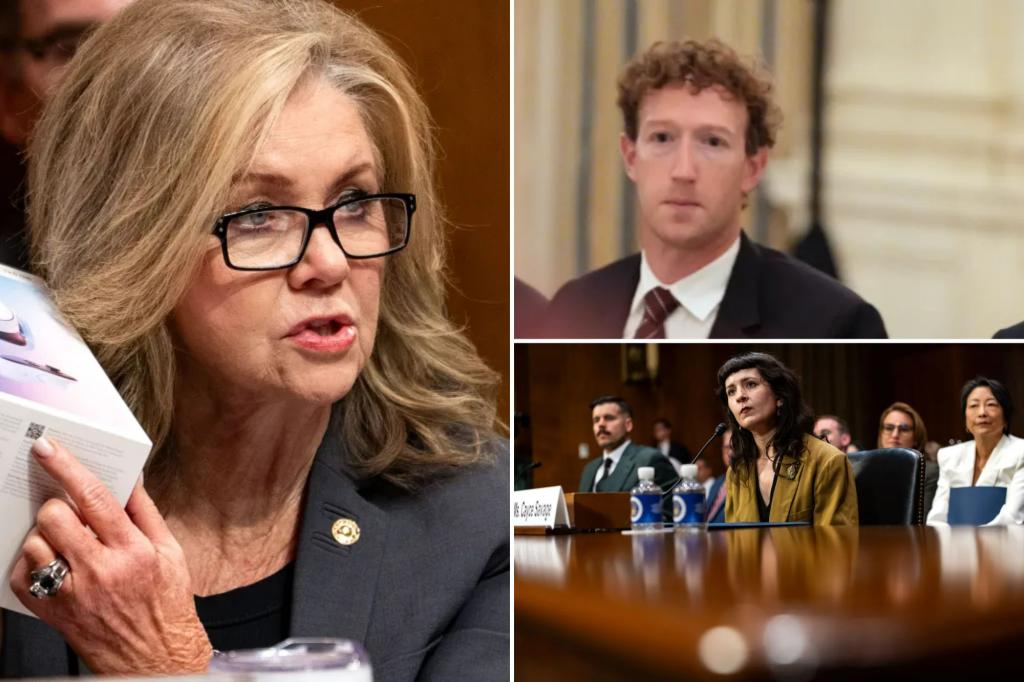Sen. Marsha Blackburn has demanded Meta boss Mark Zuckerberg respond to whistleblower accusations that the tech giant “willfully” and “intentionally” pushed virtual reality products that “they knew” were harmful to children.
Two former Meta employees testified to a Senate Judiciary subcommittee Tuesday that Meta suppressed their research about children being exposed to sexual content — including nudity, masturbation, and propositions for sexual activity — in the metaverse.
“If he [Zuckerberg] wants to refute what they [the whistleblowers] are saying, my door is open and I would welcome the opportunity to work with him on this issue,” Blackburn (R-Tenn.) told The Post in an interview Wednesday, adding: “The witnesses we had yesterday were very credible.”
The ex-Meta workers, Jason Sattizahn and Cayce Savage, had been tasked with studying the impact of the company’s VR product on underage users, and charged that the tech giant was aware of the affect the platform was having on children.
“They had made copious notes as they worked on these issues; they were frustrated with the way that Meta knowingly, willfully, intentionally, continued to push a product that they knew was causing mental health harm to children,” Blackburn said.
“All of this was known by Meta, but Meta chose to do nothing, and we’re going to continue to investigate this.”
A total of six whistleblowers have come forward with concerns about Meta’s handling of its VR program, including the two who testified this week. Sattizahn and Savage alleged that many children under the age of 13 use Meta’s VR and accused the company of taking minimal steps to rectify that.
Zuckerberg has invested heavily in virtual reality since his company acquired Oculus VR, which it later renamed Reality Labs, in 2014.
The company formerly known as Facebook even rebranded as Meta in a nod to the metaverse, a shared virtual reality space the tech giant is developing. Since then, Meta has shifted its strategy towards artificial intelligence.
Meta has forcefully pushed back against the whistleblower allegations, claiming that the ” accusations detailed in the hearing were based on selectively leaked internal documents that were picked specifically to craft a false narrative.”
“The truth is there was never any blanket prohibition on conducting research with young people and, since the start of 2022, Meta approved nearly 180 Reality Labs-related studies on issues including youth safety and well-being,” a spokesperson told The Post.
The rep also argued that its engineers have built safety features into its devices and “made it clear those devices were meant for people over 13.”
“We have also introduced automatic protections for teens to limit unwanted contact, like default voice channel settings in Horizon Worlds, so individuals can hear or be heard only from people they know, as well as personal boundaries,” the spokesperson added.
Blackburn was unmoved by Meta’s defense and called for the Federal Trade Commission (FTC) to look into the matter.
She also wants Congress to pass the Kids Online Safety and Privacy Act, a bill she has cosponsored with Sen. Richard Blumenthal (D-Conn.), to set guidelines for how social media platforms interact with children.
“You’ve got a duty of care that it would require, and also the ability of parents to have a toolbox so that they can set certain parameters for their children, so that being in the virtual space is a healthy, not a harmful space,” she explained about how the law would address her concerns with Meta.
The “duty of care” provision requires internet platforms to take “reasonable care” in combating dangers to minors such as sexual abuse, bullying, violence and more.
The Kids Online Safety and Privacy Act overwhelmingly passed the Senate last year, but was not voted on by the House.
Critics such as Sen. Rand Paul (R-Ky.) have raised free speech concerns and argued that some of the bill’s language is too broad.
“I always find it so curious that they talk about free speech as being their concern,” Blackburn said of the bill’s critics. “In the physical world, we have laws on child endangerment. We have laws that would prohibit you from exposing a child to predators, pedophiles, sex traffickers, human traffickers, drug traffickers.”
“We have laws that say you cannot sell alcohol, you cannot sell tobacco, you cannot expose a child to pornography,” she added. “But when it comes to the virtual space, people want to act like you can’t have anything that would restrict exposure of these harms to a child. So this is not a free speech issue.”
Blackburn, who won a second term in the Senate last November and is now running for Tennesse governor next year, stressed that “parents are tired of this; kids are tired of this.”
Read the full article here

